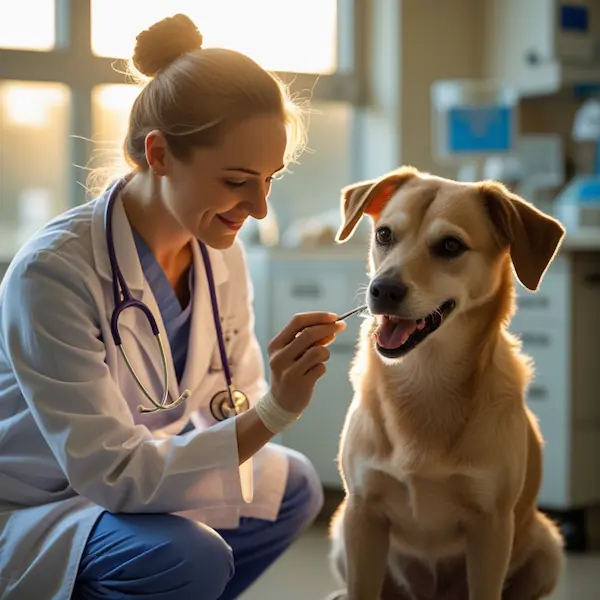Regular veterinary visits are crucial for your dog’s health. Dogs age faster than human. They require preventive care. Routine vet visits play a pivotal role in ensuring your dog lives a long and fulfilling life.
Here’s why regular vet visits are so important for your dog’s longevity:
Early Detection of Health Issues
Dogs can’t tell you when they’re feeling unwell. Birmingham Animal Hospital + Resort advocates of regular vet visit because it can be especially crucial in cases of chronic conditions, such as heart disease, diabetes, or cancer. These health problems can develop gradually in dog’s body without obvious symptoms.
Regular checkups allow the vet to catch potential problems in primary stages. Early diagnosis can significantly improve the prognosis for many health conditions.
Here’s how these visits help in identifying issues before they become serious:
Routine Health Exams
During a regular vet check-up, the vet conducts a thorough physical examination of your dog. Many health problems can be detected through this hands-on examination, even before symptoms are noticeable.
Monitoring Chronic Conditions
For dogs with known health conditions (e.g., arthritis, diabetes, or hypothyroidism), regular check-ups allow the vet to monitor the progression of the disease, adjust medications, and make lifestyle recommendations. Early adjustments manage the condition and prevent complications that may arise from unmanaged diseases.
Identifying Weight Issues
Obesity is a growing problem in dogs. A vet will assess your dog’s weight and condition score during regular visits. They will help create a balanced diet and exercise plan to manage your dog’s weight, preventing health issues before they become more severe.
Vaccinations
One of the key benefits of regular vet visits is ensuring that your dog receives the necessary vaccinations to protect against common, potentially deadly diseases, such as rabies, distemper, parvovirus, and leptospirosis.
Regular vet visits play an important role in ensuring your dog stays healthy and up to date with its vaccinations. Here’s how they help with vaccinations and overall health:
Vaccination Scheduling and Reminders
Dr Catherine Tiplady suggest of vet visits twice each year. Regular vet visits ensure that your dog gets its vaccinations on time. Some vaccines require boosters after a certain period. The vet keeps track of these schedules to ensure your dog remains protected against preventable diseases.
Assessment of Health Status
Before administering a vaccine, a veterinarian will assess your dog’s overall health. This ensures that the immune system is in the best condition to respond effectively to the vaccine.
Tailored Vaccination Plan
Not all dogs require the same vaccinations. A regular vet visit allows the veterinarian to assess factors like your dog’s age, lifestyle, and risk of exposure to certain diseases. Based on this assessment, they can recommend a personalized vaccination plan.
Dental Health and Hygiene

Dental disease is one of the most common health problems in dogs. Here are the key reasons why regular vet visits are essential for your dog’s dental health:
Prevention of Gum Disease
Gum disease (gingivitis) is caused by plaque buildup and lack of proper oral hygiene. Regular vet visits allow early detection of gum disease. Treatment can be started before it becomes a serious problem.
Early Detection of Tooth Decay
Regular vet visits include thorough dental exams where the vet can identify signs of tooth decay or worn teeth. Early treatment, such as dental cleanings or extractions, can prevent pain and further damage.
Avoiding Tooth Loss
Ignoring gum disease or infections can lead to tooth loss. Regular dental allows treatments required for your dog’s teeth and prevent premature tooth loss.
Professional Cleaning and Scaling
Even with regular at-home brushing, plaque and tartar can build up over time. Professional dental cleanings at the vet remove plaque and tartar that can’t be reached by brushing alone. This prevents plaque from hardening into tartar. Your vet may also perform scaling during these visits.
Weight Management
Regular vet visits are essential for managing your dog’s weight. Here’s how these visits can help with weight management:
Early Detection of Weight Gain or Loss
Veterinarians monitor your dog’s weight at every check-up. This helps vet to identify metabolic disorders, hormonal imbalances. Regular check-ups allow for timely interventions and adjustments to prevent unhealthy weight gain or loss.
Creating a Personalized Diet Plan
Each dog has different nutritional needs. A vet help create a tailored diet plan to ensure your dog receives the proper balance of nutrients and calories to maintain a healthy weight. They also advise on portion sizes, feeding schedules, and the right type of food.
Advice on Exercise and Activity Levels
Vets evaluate your dog’s exercise routine and overall activity level in regular basis. Based on your dog’s current condition, the vet can recommend and change the exercise plan.
Parasite Prevention and Treatment
Dogs are susceptible to parasites, including fleas, ticks, heartworms, and intestinal worms. These parasites cause Lyme disease, heart disease, or anemia.
Regular vet visits are essential for preventing and treating parasites in dogs. Here’s how these visits contribute to effective parasite management:
Early Detection of Parasites
During regular vet visits, the vet conducts thorough exams that include checking for signs of external parasites like fleas, ticks, and mites, as well as internal parasites such as worms. Early detection leads to quicker treatment.
Tailored Preventive Treatments
Parasite prevention requires regular treatment. Vets recommend the most appropriate preventive medications based on your dog’s lifestyle.
Guidance on Seasonal Parasite Risks
Some parasites are more prevalent during specific seasons. For example, ticks may be more common in warmer months, while heartworm is a year-round concern in many regions. Regular vet visits allow the vet to educate you about seasonal parasite risks and adjust your dog’s preventive care accordingly.
Tailored Health Advice for Different Life Stages

Dogs go through various physical, behavioral, and nutritional changes as they age, and regular check-ups allow the vet to monitor and adapt care plans accordingly. Here’s how vet visits offer specialized advice based on your dog’s life stage:
Puppy Stage (0-1 Year)
Your vet will guide you through the puppy vaccination schedule. The vet will also explain when booster shots are needed. He/she can recommend appropriate deworming treatments and flea/tick prevention methods based on the puppy’s age and environment.
Puppies require regular veterinary visits during their early stages of life to ensure proper growth, development, and protection from common diseases. Specialists at Cochise Animal Hospital recommends that they visit the vet every 3 to 4 weeks until they reach around 16 weeks of age. These early visits are essential for vaccinations, which help protect your puppy from various infectious diseases such as parvovirus, distemper, and rabies, as well as routine check-ups to assess overall health and development.
Puppies grow rapidly. They need special nutrition. Expert advices are needed for high-quality puppy food to support healthy development. The vet provides tailored guidance on socialization and behavioral training to help your puppy grow into a well-adjusted adult dog.
Adolescent Stage (1-3 Years)
Many dogs are spayed or neutered during this stage. The vet can ensure the best timing for these procedures. He/she can provide behavioral advice and help with any issues like chewing, jumping, or excessive barking. Regular visits ensure the right amount of food, exercise, and weight according to the breed and size.
Adult Stage (3-7 Years)
As dogs enter adulthood, regular vet visits focus on maintaining overall health and preventing age-related conditions. The vet will perform a thorough exam to assess your dog’s overall health, checking for issues like joint pain, skin conditions, or heart health.
Dog’s metabolism changes at this stage. It is important to adjust their diet. This stage is when obesity starts to become a concern, so monitoring is key.
Routine screenings (e.g., blood tests, urinalysis, fecal exams) detect underlying health problems, such as kidney or liver issues, that may begin in the adult years.
Senior Stage (7+ Years)
Senior dogs should have more frequent vet check-ups (typically twice a year). These exams focus on detecting signs of aging-related conditions like arthritis, cataracts, hearing loss, and cognitive dysfunction.
Cognitive dysfunction syndrome (dementia) affects older dogs. Regular vet visit guide you on signs to look out for, such as confusion or disorientation.
Behavioral Concerns and Mental Well-being
Regular vet visits offer an opportunity to discuss any behavioral concerns you dog may have. Here’s how regular vet visits can help with behavioral concerns and mental health:
Identifying Medical Causes
Many behavioral issues in dogs, such as aggression, anxiety, excessive barking, or house-soiling, can be linked to medical conditions. Regular vet visits allow for early detection of underlying health problems. Pain, thyroid imbalance, Cognitive Dysfunction Syndrome (CDS), and hormonal changes can cause behavioral changes in dogs.
Mental Health Support for Anxiety and Stress
Dogs, like people, can suffer from anxiety, stress, and depression. Regular vet visits ensure your dog’s emotional well-being. Your vet can guide you on managing these issues. Vet suggests calming supplements, medications, or specific training techniques to alleviate anxiety. Regular visits help to detect the right guideline or medication for your dog.
Enrichment and Mental Stimulation
A vet advice on ways to keep your dog mentally engaged. This is especially important for intelligent or high-energy breeds that require more mental and physical activity to stay happy. Vets can recommend toys and activities that challenge your dog’s brain. He/she can suggest types of training based on your dog’s personality and needs.
Developing a Long-Term Behavioral Plan
With regular check-ups, your vet creates a long-term behavioral plan to maintain your dog’s mental well-being as they age. This includes addressing any emerging behavioral concerns, adjusting their diet and exercise routine, and continuing to monitor their health.
Improved Longevity
Studies show that dogs who receive regular veterinary care live longer and healthier lives. Preventive care, early intervention, and ongoing health monitoring reduce the risk of developing severe or life-threatening conditions. Regular checkups also help ensure that your dog remains free from pain, discomfort, and illness, which all contribute to a longer, more enjoyable life.
What a Veterinarian Generally Check in Dogs

Physical Examination
Eyes: Checking for any signs of redness, discharge, or abnormal pupil reactions.
Ears: Looking for signs of infection, mites, or earwax buildup.
Mouth and Teeth: Examining teeth for plaque, tartar, and gum health, and checking the mouth for lesions, abscesses, or other abnormalities.
Nose: Ensuring the nose is clear, not congested, and free from discharge.
Coat and Skin: Inspecting the coat for fleas, ticks, dryness, lumps, or any other abnormalities.
Weight and Body Condition
Monitoring weight to ensure it’s within a healthy range.
Assessing the body condition score to ensure the dog isn’t underweight or overweight.
Vital Signs
Checking temperature, pulse, and respiration rate to ensure they are within normal ranges.
Vaccination and Preventative Care
Reviewing and updating vaccinations.
Discussing parasite prevention.
Checking for any signs of current infections or illnesses.
Urinalysis
Testing the urine for any signs of infection, kidney issues, or diabetes.
Dental Health
Checking for any dental issues such as gum disease, tooth decay, or malocclusion.
Fecal Exam (for parasites)
Examining stool samples for parasites like worms or other gastrointestinal issues.
Behavioral Assessment
Discussing any changes in behavior, such as lethargy, aggression, or changes in appetite.
Special Considerations for Age and Breed
Older dogs may have additional tests like joint evaluations, cognitive function checks, or screenings for age-related diseases.
Certain breeds may require breed-specific tests for genetic conditions.
Regular vet visits help prevent disease, detect issues early, manage existing conditions, and ensure your dog lives a long and happy life. By committing to regular veterinary care, you’re investing in your dog’s longevity and strengthening the bond you share with your furry companion.
Reference:
- Routine Vet Visits: Ensuring Your Pet’s Health and Happiness. Birmingham Animal Hospital + Resort.
- Why Regular Vet Visits Are Essential for Your Pet’s Health. Cochise Animal Hospital.
- How often should my dog visit the vet? RSPCA Pet Insurance.




